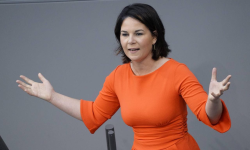You are using an out of date browser. It may not display this or other websites correctly.
You should upgrade or use an alternative browser.
You should upgrade or use an alternative browser.
Unrest in Israel (Hamas war)
- Thread starter pmbug
- Start date
Welcome to the Precious Metals Bug Forums
Welcome to the PMBug forums - a watering hole for folks interested in gold, silver, precious metals, sound money, investing, market and economic news, central bank monetary policies, politics and more.
Why not register an account and join the discussions? When you register an account and log in, you may enjoy additional benefits including no Google ads, market data/charts, access to trade/barter with the community and much more. Registering an account is free - you have nothing to lose!
- Messages
- 34,855
- Reaction score
- 5,928
- Points
- 288
By James Stavridis (Bloomberg) In my military career, I was frequently deployed on the US Navy’s massive nuclear-powered aircraft carriers into combat and on more routine peacetime missions.
I embarked in the USS Abraham Lincoln as a commodore in the late 1990s, and I sailed around South America in the USS Eisenhower as a four-star admiral in command of US Southern Command in 2009. These are fearsome machines of war, apex predators at sea with significant land-attack powers as well.
But in many ways, the most satisfying deployment I commanded was not a carrier: It was USNS Comfort, a 60,000-ton hospital ship with nearly 1,000 beds and a main battery consisting not of combat jets but of doctors and nurses. The ship has nearly 100 intensive-care beds, with total accommodations for more than 1,300 people if necessary.

 gcaptain.com
gcaptain.com
I embarked in the USS Abraham Lincoln as a commodore in the late 1990s, and I sailed around South America in the USS Eisenhower as a four-star admiral in command of US Southern Command in 2009. These are fearsome machines of war, apex predators at sea with significant land-attack powers as well.
But in many ways, the most satisfying deployment I commanded was not a carrier: It was USNS Comfort, a 60,000-ton hospital ship with nearly 1,000 beds and a main battery consisting not of combat jets but of doctors and nurses. The ship has nearly 100 intensive-care beds, with total accommodations for more than 1,300 people if necessary.

Should The US Navy Send Hospital Ships To Gaza?
Should the US Navy send a hospital ship to Gaza? This insightful account delves into the strategic deployment of hospital ships in conflict zones, highlighting the crucial role of medical aid in war-torn areas. Discover the challenges and triumphs of balancing military might with humanitarian...
 gcaptain.com
gcaptain.com
- Messages
- 34,855
- Reaction score
- 5,928
- Points
- 288
by Dan Williams (Reuters) Israel said on Sunday that Yemen’s Houthis had seized a British-owned and Japanese-operated cargo ship in the southern Red Sea, describing the incident as an “Iranian act of terrorism” with consequences for international maritime security.
The Houthis said they had seized a ship in that area, but described it as Israeli. “We are treating the ship’s crew in accordance with Islamic principles and values,” a spokesperson for the group said, making no reference to the Israeli account.

 gcaptain.com
gcaptain.com
The Houthis said they had seized a ship in that area, but described it as Israeli. “We are treating the ship’s crew in accordance with Islamic principles and values,” a spokesperson for the group said, making no reference to the Israeli account.

Israel Reports Houthi Forces Seized Two Cargo Ships in the Red Sea
Israel reports the seizure of a British-owned, Japanese-operated cargo ship by Yemen's Houthis in the Red Sea, escalating tensions in international maritime security. The incident, labeled as an 'Iranian act of terrorism' by Israel, raises concerns over the safety of global shipping routes amid...
 gcaptain.com
gcaptain.com
- Messages
- 34,855
- Reaction score
- 5,928
- Points
- 288
HOW IRAN AND ITS ALLIES HOPE TO SAVE HAMAS
“We kiss the foreheads and the arms of the shrewd and astute planners and the courageous Palestinian youth.” On Oct. 10, Iranian Supreme Leader Ayatollah Ali Khamenei expressed his unambivalent support for Hamas’ attack against Israel. Yet he swiftly repudiated any Iranian involvement, claiming, “Those who attribute the acts of the Palestinians to outsiders fail to understand the Palestinian people. They have underestimated them.” Khamenei’s remarks perfectly encapsulate Iran’s stance on the war in Gaza over the past month: championing Palestinian “resistance” against Israel while concurrently underscoring the autonomy of Hamas and other “resistance movements.” Indeed, both U.S. and Israeli authorities have, so far, found no concrete evidence linking Iran directly to the attack. Yet Iran’s extensive military, economic, and political backing for Hamas is widely acknowledged.At the same time, Khamenei and other Iranian officials have been warning both Israel and its allies that their actions in Gaza could trigger escalation. Against this backdrop, there have already been increased hostilities between Israel and Hizballah along the Lebanese border, as well as rocket strikes against the Israeli-occupied Golan Heights from Syrian territories. Meanwhile, Iranian-supported militias in Iraq have escalated their operations against U.S. assets. In less than a month, between Oct. 17 and Nov. 13, there have been 52 recorded incidents targeting U.S. entities in both countries. Finally, the Iranian-backed Houthi rebels of Yemen have also proclaimed their participation in the conflict, launching missile and drone attacks targeting southern Israel.

How Iran and Its Allies Hope to Save Hamas - War on the Rocks
“We kiss the foreheads and the arms of the shrewd and astute planners and the courageous Palestinian youth.” On Oct. 10, Iranian Supreme Leader Ayatollah
warontherocks.com
- Messages
- 18,528
- Reaction score
- 11,155
- Points
- 288
It's All Made Up | Larry C. Johnson
Larry C. Johnson is a veteran of the CIA and the State Department’s Office of Counter Terrorism. He is the founder and managing partner of BERG Associates, which was established in 1998. Larry provided training to the US Military’s Special Operations community for 24 years. He has been vilified by the right and the left, which means he must be doing something right. You can also follow him on telegram (t.me/sonar_21 (https://t.me/sonar_21), Patreon and Substack (https://larrycjohnson.substack.com).21m
- Messages
- 34,855
- Reaction score
- 5,928
- Points
- 288
Helicopter Assault on MV Galaxy Leader in the Red Sea by Houthi/Yemeni Forces
Nov 20, 202312:51
In this episode, Sal Mercogliano - maritime historian at Campbell University (@campbelledu) and former merchant mariner - discusses the video footage provided by the Yemen military of the helicopter assault on MV Galaxy Leader and new information regarding the ship's seizure.
- Houthi/Yemen Original Video https://twitter.com/JoeTruzman/status...
- Marine Traffic: Galaxy Leader https://www.marinetraffic.com/en/ais/...
- H I Sutton at Covert Shores https://twitter.com/CovertShores/stat...
- Yemen’s Houthi rebels hijack an Israeli-linked ship in the Red Sea and take 25 crew members hostage https://apnews.com/article/israel-hou...
- NYK Ro/Ro Schedule https://www.nykroro.com/customer/sche...
- Messages
- 34,855
- Reaction score
- 5,928
- Points
- 288
GAZA/JERUSALEM, Nov 21 (Reuters) - The leader of Hamas said on Tuesday that a truce agreement with Israel was close, and Prime Minister Benjamin Netanyahu said he hoped for good news soon about hostages, the most optimistic signals so far of a deal to pause fighting and free captives.
Hamas officials were "close to reaching a truce agreement" with Israel and the group has delivered its response to Qatari mediators, Hamas leader Ismail Haniyeh said in a statement sent to Reuters by his aide.

 www.reuters.com
www.reuters.com
Hamas officials were "close to reaching a truce agreement" with Israel and the group has delivered its response to Qatari mediators, Hamas leader Ismail Haniyeh said in a statement sent to Reuters by his aide.

Netanyahu, Hamas chief indicate deal on Gaza truce and hostages is close
The leader of Hamas said on Tuesday that a truce agreement with Israel was close, and Prime Minister Benjamin Netanyahu said he hoped for good news soon about hostages, the most optimistic signals so far of a deal to pause fighting and free captives.
- Messages
- 34,855
- Reaction score
- 5,928
- Points
- 288
Air strikes and lentil soup: life grinds on in wartime Gaza
GAZA, Nov 21 (Reuters) - Children poke at rubble with their feet after an air strike and pick up household items from the debris. Families queue for sacks of flour distributed by U.N. workers. Volunteers cook lentil soup to warm up displaced people drenched by rain.Life was grinding on across the Gaza Strip on Tuesday, in the seventh week of the war between Israel and Hamas, with a new normal defined by destruction, displacement and the daily hardship of looking for food and trying to stay dry.

Air strikes and lentil soup: life grinds on in wartime Gaza
Children poke at rubble with their feet after an air strike and pick up household items from the debris. Families queue for sacks of flour distributed by U.N. workers. Volunteers cook lentil soup to warm up displaced people drenched by rain.
- Messages
- 34,855
- Reaction score
- 5,928
- Points
- 288
AC-130 Ghostrider Gunship Strikes Iranian-Backed Militia In Iraq
PUBLISHED NOV 21, 2023 12:42 PM ESTAU.S. Air Force AC-130J Ghostrider gunship struck a vehicle Tuesday near Baghdad involved in recent attacks on the Al-Asad airbase in Iraq, a U.S. official told The War Zone Tuesday. It was the first time the U.S. has struck a target in Iraq since the outbreak of the Israel-Hamas war Oct. 7.
At least one member of the Iranian-backed Kataib Hezbollah militia was killed in the attack, said the official, speaking on condition of anonymity to discuss operational details. The official did specify what role the vehicle or occupants had in the attacks on Al-Asad.
More:

AC-130 Ghostrider Gunship Strikes Iranian-Backed Militia In Iraq
This marks the fourth U.S. airstrike against Iranian-backed militias since Oct. 26 and the first on a target in Iraq.
- Messages
- 34,855
- Reaction score
- 5,928
- Points
- 288
GAZA/TEL AVIV, Nov 22 (Reuters) - Israel's government and Hamas on Wednesday agreed to a four-day pause in fighting to allow the release of 50 hostages held in Gaza in exchange for 150 Palestinians imprisoned in Israel, and the entry of humanitarian aid into the besieged enclave.

 www.reuters.com
www.reuters.com

Israel, Hamas agree deal for release of Gaza hostages, truce
Israel's government and Hamas on Wednesday agreed to a four-day pause in fighting to allow the release of 50 hostages held in Gaza in exchange for 150 Palestinians imprisoned in Israel, and the entry of humanitarian aid into the besieged enclave.
- Messages
- 18,528
- Reaction score
- 11,155
- Points
- 288
When Ignorance Rules | Andrei Martyanov
ANDREI MARTYANOV is an expert on Russian military and naval issues. He was born in Baku, USSR in 1963. He graduated from the Kirov Naval Red Banner Academy and served as an officer on the ships and staff position of the Soviet Coast Guard through 1990. He took part in the events in the Caucasus which led to the collapse of the Soviet Union. In the mid-1990s he moved to the United States where he currently works as Laboratory Director in a commercial aerospace group. He is a frequent blogger on the US Naval Institute Blog. He is the author of Losing Military Supremacy, The (Real) Revolution in Military Affairs, and Disintegration: Indicators of the Coming American Collapse.60m
- Messages
- 34,855
- Reaction score
- 5,928
- Points
- 288
USS Thomas Hudner Downs Multiple Drones Launched from Yemen
November 22, 2023 9:35 PMUSS Thomas Hudner (DDG-116) shot down multiple one-way attack drones launched from Houthi-controlled areas in Yemen, U.S. Central Command announced on X, the site formerly known as Twitter, Wednesday night.
This is the second time Thomas Hudner shot down drones launched from Yemen in two weeks. The guided-missile destroyer also shot down a drone in the Red Sea on Nov. 15, USNI News previously reported.
More:
- Messages
- 18,528
- Reaction score
- 11,155
- Points
- 288

“Why don’t you call for a ceasefire in Gaza if you yourself have seen this suffering?”:
“Because in order to alleviate this suffering, it is necessary to provide, especially now in the Gaza Strip, people with the most necessary things, such like water and food.
Calling simply on impulse will not help. Saying that guns should remain silent is not a matter for politicians.”
🎙Subscribe @TheIslanderNews
- Messages
- 34,855
- Reaction score
- 5,928
- Points
- 288

Israeli-linked chemical tanker seized in Gulf of Aden, US official, vessel company say
Unidentified armed individuals have seized a tanker carrying a cargo of phosphoric acid in the Gulf of Aden on Sunday, the vessel's managing company and a U.S. defence official said.
- Messages
- 34,855
- Reaction score
- 5,928
- Points
- 288

Israeli-linked chemical tanker seized in Gulf of Aden, US official, vessel company say
Unidentified armed individuals have seized a tanker carrying a cargo of phosphoric acid in the Gulf of Aden on Sunday, the vessel's managing company and a U.S. defence official said.www.reuters.com

US Navy seizes attackers who held Israel-linked tanker
Houthi rebels fired missiles towards the warship which chased the armed men trying to escape by boat.
- Messages
- 34,855
- Reaction score
- 5,928
- Points
- 288
^^^^^^
A little more:
Five people suspected of attempting to hijack a merchant ship in the Gulf of Aden are in U.S. Navy custody, a defense official confirmed to USNI News on Sunday.
The five had boarded and attempted to take control of the M/V Central Park, a tanker owned by an Israeli businessman, on Sunday while the ship was transiting the Gulf of Aden, the official confirmed.
Before the pirates could take control of the ship, the crew had barricaded themselves in the tanker’s citadel, an armored panic room. Unable to seize the crew, the pirates boarded a skiff and headed toward Yemen. Guided-missile destroyer USS Mason (DDG-87) and an unidentified Japanese Maritime Self-Defense Force ship responded to the incident, the defense official confirmed. The crew of Mason pursued the skiff as it headed toward Yemen with the ship’s embarked helicopter and ultimately detained the five for questioning, the official confirmed.
Fox News first reported the details of the detention on Sunday.
Read it all:
A little more:
U.S. Navy Detains 5 After Failed Attempt to Capture Merchant Ship, IKE in Persian Gulf
This post has been updated with a statement from U.S. Central Command.Five people suspected of attempting to hijack a merchant ship in the Gulf of Aden are in U.S. Navy custody, a defense official confirmed to USNI News on Sunday.
The five had boarded and attempted to take control of the M/V Central Park, a tanker owned by an Israeli businessman, on Sunday while the ship was transiting the Gulf of Aden, the official confirmed.
Before the pirates could take control of the ship, the crew had barricaded themselves in the tanker’s citadel, an armored panic room. Unable to seize the crew, the pirates boarded a skiff and headed toward Yemen. Guided-missile destroyer USS Mason (DDG-87) and an unidentified Japanese Maritime Self-Defense Force ship responded to the incident, the defense official confirmed. The crew of Mason pursued the skiff as it headed toward Yemen with the ship’s embarked helicopter and ultimately detained the five for questioning, the official confirmed.
Fox News first reported the details of the detention on Sunday.
Read it all:
- Messages
- 34,855
- Reaction score
- 5,928
- Points
- 288

U.S. Navy Destroyer Targeted by Ballistic Missiles off Yemeni Coast
The U.S. Department of Defense has confirmed that two ballistic missiles were launched towards the USS Mason from Yemen early Monday morning.
 gcaptain.com
gcaptain.com
- Messages
- 34,855
- Reaction score
- 5,928
- Points
- 288
One of the Royal Navy’s most advanced vessels, the HMS Diamond, one of the six-member Type 45 destroyers launched a decade ago, is underway to the Middle East. The vessel departed Portsmouth a week ago the Royal Navy reports with a mission to strengthen patrols aimed at ensuring freedom of navigation, reassuring merchant vessels, and ensuring the safe flow of trade.

 maritime-executive.com
maritime-executive.com

UK Deploys One of its Most Advanced Vessels to the Middle East
One of the Royal Navy’s most advanced vessels, the HMS Diamond, one of the six-member Type 45 destroyers launched a decade ago, is underway to the Mi...
- Messages
- 34,855
- Reaction score
- 5,928
- Points
- 288
Report on Israel and Hamas 2023 Conflict, U.S. Policy Options
The following is the Nov. 30, 2023, Congressional Research Service report, Israel and Hamas 2023 Conflict In Brief: Overview, U.S. Policy, and Options for Congress.From the report
On October 7, 2023, the Palestinian Sunni Islamist group Hamas (a U.S.-designated foreign terrorist organization, or FTO) led surprise attacks against Israel from the Gaza Strip by land, sea, and air. The assault came on a Jewish holiday, 50 years after the Egypt-Syria surprise attack on Israel that sparked the 1973 Yom Kippur War. The October 7 assault’s scope and lethality against Israel have no precedent in the 16 years Hamas has controlled Gaza, and the nature of the violence stunned Israelis. The apparent intelligence and operational failures in preventing the assault have become a subject of analysis for Israeli and U.S. officials. Iran reportedly provides material support to Hamas, and according to U.S. officials may be complicit in a broad sense, but President Joe Biden said in October “there is no evidence” that Iran helped plan the attack.More here:
- Messages
- 34,855
- Reaction score
- 5,928
- Points
- 288

Lindsey Graham says he's 'lost all confidence' in Defense Secretary Lloyd Austin over Israel-Hamas war
Lindsey Graham said he's "lost all confidence" in Defense Secretary Lloyd Austin over his calls for Israel to protect Palestinian civilians.
www.usatoday.com
- Messages
- 34,855
- Reaction score
- 5,928
- Points
- 288
RIYADH, Dec 3 (Reuters) – Three commercial vessels came under attack in international waters in the southern Red Sea, the U.S. military said Sunday, as Yemen’s Houthi group claimed drone and missile attacks on two Israeli vessels in the area.
The Carney, an American destroyer, responded to distress calls and provided assistance following missile and drone launches from Houthi-controlled territory, according to U.S. Central Command.

 gcaptain.com
gcaptain.com
The Carney, an American destroyer, responded to distress calls and provided assistance following missile and drone launches from Houthi-controlled territory, according to U.S. Central Command.

UPDATED: Multiple Commercial Vessels Attacked In Red Sea
By Aziz El Yaakoubi and Idrees Ali RIYADH, Dec 3 (Reuters) – Three commercial vessels came under attack in international waters in the southern Red Sea, the U.S. military said Sunday, as...
 gcaptain.com
gcaptain.com


